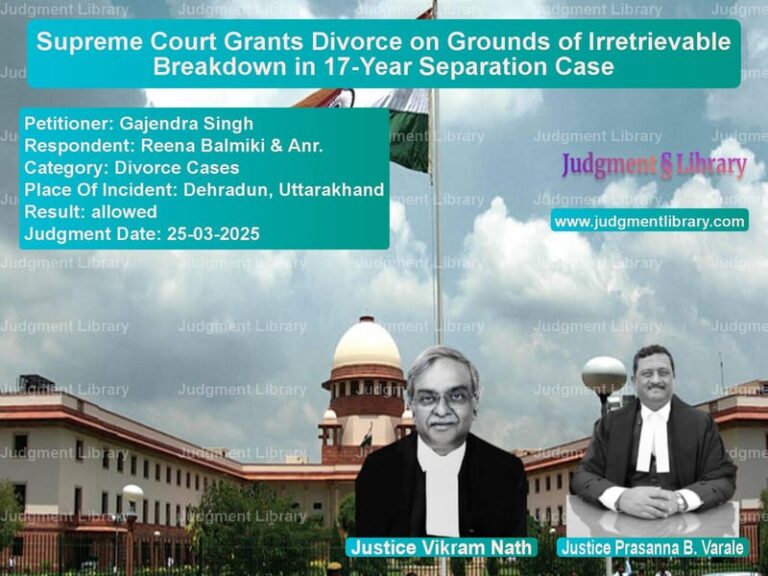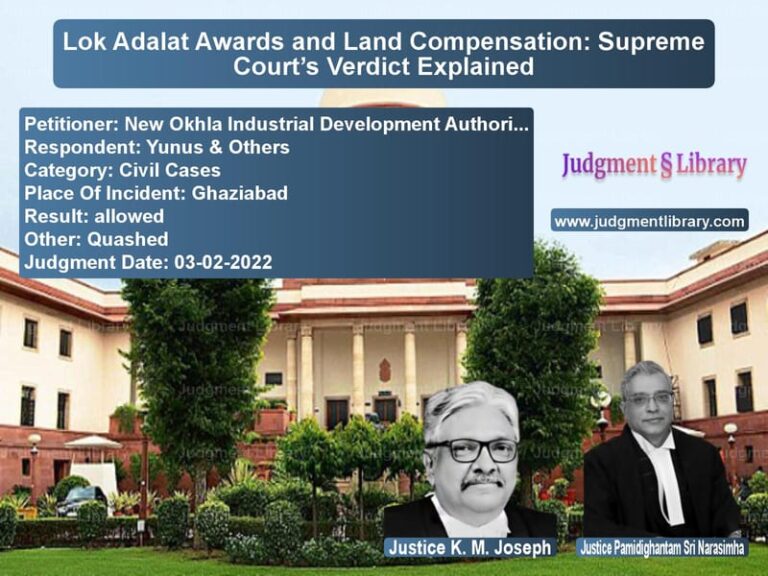Supreme Court Rules on Benami Property Dispute: Family Ownership and Legal Title
The Supreme Court of India has ruled on a long-standing property dispute in the case of Vinod Kumar Dhall v. Dharampal Dhall (Deceased) Through LRS. & Ors.. The case revolved around the question of ownership of a house in New Delhi and whether it was acquired as a benami property in the name of one family member while being funded by another. The Court examined the principles of joint family property, benami transactions, and the legal burden of proof in such disputes.
Background of the Case
The property in dispute, House No. ED-48, Tagore Garden, New Delhi, was claimed by both parties as their rightful possession. The plaintiff, Dharampal Dhall, asserted that he was the rightful owner, having acquired leasehold rights under a perpetual lease deed granted by the President of India and registered in 1966. The defendant, Vinod Kumar Dhall, argued that the property was a joint family asset, purchased by their father, Kashmiri Lal Dhall, and that all siblings had a right to it.
Key Facts:
- The property was originally allotted in 1963 in the name of Kumari Sneh Lata, the eldest child of Kashmiri Lal Dhall.
- The leasehold rights were later transferred to Dharampal Dhall in 1966.
- Construction on the plot was completed in 1965-66, allegedly funded by Kashmiri Lal Dhall.
- The house was occupied by the entire family, including the plaintiff and defendants.
- The dispute arose when the plaintiff sought to evict the defendants, claiming exclusive ownership.
- The trial court ruled in favor of the plaintiff, a decision upheld by the High Court.
- The defendant, aggrieved by the decision, appealed to the Supreme Court.
Petitioner’s (Vinod Kumar Dhall) Arguments
- The petitioner contended that the property was acquired using joint family funds, with contributions from their father, Kashmiri Lal Dhall.
- He argued that the plaintiff was merely a nominal owner and that the house was meant for the entire family.
- The suit was barred by limitation and should not have been entertained.
- Documents such as house tax receipts and utility bills in the plaintiff’s name did not establish exclusive ownership.
Respondent’s (Dharampal Dhall) Arguments
- The respondent asserted that he acquired the leasehold rights legally in 1966 and that his father had no claim over the property.
- He contended that the house was his self-acquired property, and his siblings had no legal rights over it.
- The claim of joint family ownership was not supported by documentary evidence.
- He was merely allowing his sister (Defendant No. 2) to stay temporarily due to marital issues but had asked both defendants to vacate.
Supreme Court’s Observations
The Supreme Court examined the documentary evidence and the legal principles governing benami transactions. Key observations included:
- “There is no presumption that a property is joint simply because a family is joint. The burden of proof lies on the party claiming joint ownership.”
- “Where a property is acquired in one person’s name but funded by another, the real test is the source of the consideration.”
- “The defendant has failed to establish that the father had funded the property, while the plaintiff has legal documents supporting his claim.”
- “The suit is not barred by limitation as the plaintiff took action upon realizing that the defendants refused to vacate.”
Key Legal Precedents Considered
- Surendra Kumar v. Phoolchand (1996) – Established that joint family ownership must be proven with evidence of common funds.
- Union of India v. Moksh Builders & Financiers Ltd. (1977) – Stressed that the key factor in benami cases is the source of funds.
- Vathsala Manickavasagam v. N. Ganesan (2013) – Held that properties acquired with joint family funds are presumed to be joint unless proven otherwise.
Final Judgment
The Supreme Court allowed the appeal and overturned the decisions of the lower courts, ruling:
“The evidence overwhelmingly suggests that the property was acquired using joint family funds. The claim of exclusive ownership by the plaintiff is not sustainable. The suit is dismissed.”
The Court ruled that the house remained a family property and that all siblings had a right to its possession.
Significance of the Judgment
The Supreme Court’s ruling sets a precedent in property disputes involving family-owned assets. It clarifies that:
- Joint family properties require clear evidence of ownership.
- Benami transactions must be proved with concrete financial records.
- Documents such as lease deeds and tax receipts alone do not establish absolute ownership.
- Possession and use by the entire family indicate a shared ownership interest.
Conclusion
The ruling in Vinod Kumar Dhall v. Dharampal Dhall emphasizes that property disputes within families must be decided based on evidence of financial contributions and long-term usage patterns. By setting aside the High Court’s ruling, the Supreme Court has ensured that rightful ownership is determined based on factual evidence rather than mere documentation.
Petitioner Name: Vinod Kumar Dhall.Respondent Name: Dharampal Dhall (Deceased) Through LRS. & Ors..Judgment By: Justice Arun Mishra, Justice Uday Umesh Lalit.Place Of Incident: New Delhi.Judgment Date: 25-04-2018.
Don’t miss out on the full details! Download the complete judgment in PDF format below and gain valuable insights instantly!
Download Judgment: Vinod Kumar Dhall vs Dharampal Dhall (Dec Supreme Court of India Judgment Dated 25-04-2018.pdf
Direct Downlaod Judgment: Direct downlaod this Judgment
See all petitions in Property Disputes
See all petitions in Landlord-Tenant Disputes
See all petitions in Succession and Wills
See all petitions in Judgment by Arun Mishra
See all petitions in Judgment by Uday Umesh Lalit
See all petitions in allowed
See all petitions in supreme court of India judgments April 2018
See all petitions in 2018 judgments
See all posts in Civil Cases Category
See all allowed petitions in Civil Cases Category
See all Dismissed petitions in Civil Cases Category
See all partially allowed petitions in Civil Cases Category







